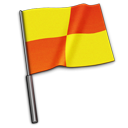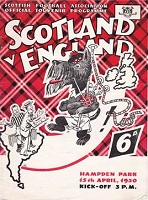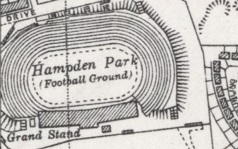 flg.jpg) "ENGLAND
WON, BUT WHAT A CLOSE SHAVE"
The People "ENGLAND
WON, BUT WHAT A CLOSE SHAVE"
The People |
  Officials
from England Officials
from England |
Scotland |
UK ruling on substitutes |
England |
Referee
(black blazer)
Reginald James
Leafe
35 (15 December 1914),
Lambley, Nottingham |
 |
|
red flag
Linesmen
yellow flag |
Willis B. Everett
Woodridge, Suffolk |
Leslie A.M.
Mackay
(1912), Fulham |
|
|
|
 Scotland
Team Scotland
Team |
| |
|
Rank |
No official ranking system established;
ELO rating 9th to 10th |
Colours |
Dark blue jerseys
with white collars, white shorts, blue socks with red tops. |
|
Captain |
George Young |
Selection |
The Scottish Football Association
Selection Committee
on Monday, 3 April 1950. |
|
Trainer: A. Dowdells (The Celtic FC) |
 Scotland
Lineup Scotland
Lineup |
|
|
Cowan, James C. |
23
303 days |
16 June 1926 |
G |
Greenock Morton FC |
9 |
10ᵍᵃ |
|
2 |
Young, George L. |
27
170 days |
27 October 1922 |
RB |
Rangers FC |
16 |
0 |
|
3 |
Cox, Samuel R. |
26
2 days |
13 April 1924 |
LB |
Rangers FC |
5 |
0 |
|
665 |
4 |
McColl, John Miller |
22
312 days |
7 June 1927 |
RHB |
Rangers FC |
1 |
0 |
|
5 |
Woodburn, William A. |
30
250 days |
8 August 1919 |
CHB |
Rangers FC |
10 |
0 |
|
6 |
Forbes, Alexander R. |
25
84 days |
21 January 1925 |
LHB |
Arsenal FC, England |
6 |
0 |
|
7 |
Waddell, William |
29
39 days |
7 March 1921 |
OR |
Rangers FC |
7 |
5 |
|
666 |
8 |
Moir, William |
27
361 days |
19 April 1922 |
IR |
Bolton Wanderers FC, England |
1 |
0 |
|
only app
1950 |
|
667 |
9 |
Bauld, William R.L. |
23
81 days |
24 January 1927 |
CF |
Hearts of Midlothian FC |
1 |
0 |
|
10 |
Steel, William |
26
349 days |
1 May 1923 |
IL |
Derby County FC, England |
14 |
7 |
|
11 |
Liddell, William B. |
28
95 days |
10 January 1922 |
OL |
Liverpool FC, England |
7 |
0 |
|
reserves: |
Travelling reserves are Robert Evans (The Celtic FC) and Lawrie Reilly (Hibernian FC).
Full team of reserves are Brown (Rangers FC);
Lapsley (St.Mirren FC) and Jock Shaw (Rangers FC); Robert Evans, Dougan
(Hearts of Midlothian FC) and George Aitken
(East Fife FC); Billy Liddell (Liverpool FC) and James Mason (Third
Lanark FC); Willie Bauld; Brown (East Fife FC) and Lawrie Reilly; |
|
team changes: |
Bauld replaced Queen of the South's Billy Houliston as the
centre-forward. |
|
team notes: |
The Scotland team were put under 'ridiculous' pressure to win this
match. A victory for them would see them go to the World Cup Finals.
Willie Woodburn had a stitch inserted in a deep cut
above his left eye immediately after the match. He had a continuous
stream of blood down his face throughout the second half. |
|
|
|
2-3-5 |
Cowan -
Young, Cox -
McColl, Woodburn, Forbes -
Waddell, Moir, Bauld, Steel, Liddell. |
|
Averages: |
Age |
26
years 188 days |
Appearances/Goals |
7.0 |
1.1 |
|
|
|
flg.jpg) England
Team England
Team |
| |
|
Rank |
No official ranking system established;
ELO rating 3rd to 2nd |
Colours |
The
1949 home uniform -
White collared jerseys, blue shorts, red socks.
|
|
P 9th of 43, W 6 - D 0 - L 3 - F
25 - A 13. |
Captain |
Billy Wright
|
Manager |
Walter Winterbottom, 37 (31 March 1913), appointed as FA national director of coaching/team manager on 8 July 1946; |
|
12th of 90, W 9 - D 0 - L 3 - F 33 - A 14. |
P 27th of 139, W 20 - D 3 - L 4 - F 91 - A 27. |
 ² ² |
Team chosen by Selection Committee headed by Arthur Drewry on
Wednesday, 5 April. |
flg.jpg) England
Lineup England
Lineup |
|
|
four
changes to the previous match
(Watson, Rowley, Pearson & Froggatt out) |
league position
(5 April) |
|
|
|
Williams, Bert F. |
30
74 days |
31 January 1920 |
G |
Wolverhampton
Wanderers FC (FL 6th) |
5 |
4ᵍᵃ |
|
2 |
Ramsey, Alfred E. |
30
83 days |
22 January 1920 |
RB |
Tottenham Hotspur FC
(FL2 TOP) |
3 |
0 |
|
3 |
Aston, John |
28
224 days |
3 September 1921 |
LB |
Manchester United FC
(FL TOP) |
12 |
0 |
|
4 |
Wright, William A. |
26
68 days |
6 February 1924 |
RHB |
Wolverhampton
Wanderers FC (FL
6th) |
27 |
2 |
|
5 |
Franklin,
Cornelius |
28
81 days |
24 January 1922 |
CHB |
Stoke
City FC (FL 15th) |
27 |
0 |
|
final app
1946-50 |
|
6 |
Dickinson, James W. |
24
356 days |
24 April 1925 |
LHB |
Portsmouth FC (FL 5th) |
5 |
0 |
|
7 |
Finney,
Thomas |
28
10 days |
5 April 1922 |
OR |
Preston
North End FC (FL2
7th) |
23 |
14 |
|
8 |
Mannion,
Wilfred
J. |
31
334 days |
16 May 1918 |
IR |
Middlesbrough FC
(FL 9th) |
17 |
8 |
|
9 |
Mortensen, Stanley H. |
28
324 days |
26 May 1921 |
CF |
Blackpool FC
(FL 3rd) |
16 |
17 |
10
 |
Bentley, T.F. Roy |
25
333 days |
17 May 1924 |
IL |
Chelsea FC
(FL 12th) |
2 |
1 |
11
 |
Langton,
Robert |
31
219 days |
8 September 1918 |
OL |
Bolton Wanderers FC (FL
16th) |
10 |
1 |
|
the sixteenth Wanderer to represent England |
|
reserves: |
Willie Watson (Sunderland AFC
(FL 4th)) and
Jackie Milburn (Newcastle United FC
(FL 8th)). |
|
team notes: |
Billy Wright and Neil Franklin, both playing in their 27th consecutive
match, break the record set by Ernie Blenkinsop's 26.
Stan
Mortensen suffered from a nasty groin scrape sustained when he landed
on the track after a Woodburn tackle.
The poor form suffered by
Billy Wright in the first part of the season was remedied and put
behind him by this point. He had a blood clot surgically removed which
reset his body's balance...and his form. |
|
records: |
This victory, the fourth in a row, equals the post-war record set back in
1946. |
|
The England team were set up
in the Marine Hotel in Troon, training at Ayr United FC's ground,
prior to this match. |
|
|
|
2-3-5 |
Williams -
Ramsey, Aston -
Wright, Franklin, Dickinson
-
Finney, Mannion, Mortensen, Bentley, Langton. |
|
Averages: |
Age |
28
years 227 days |
Appearances/Goals |
13.4 |
3.8 |
|
most experienced post war team
so far |
|
England teams
v. Scotland: |
|
1949: |
Swift |
Aston |
Howe |
Wright |
Franklin |
Cockburn |
Matthews |
Mortensen |
Milburn |
Pearson |
Finney |
|
1950: |
Williams |
Ramsey |
Aston |
Wright |
Franklin |
Dickinson |
Finney |
Mannion |
Mortensen |
Bentley |
Langton |
|
|
|
|
News |
|
"The Welsh Football Association protested to
the FA and SFA over the appointment of an English referee for this match.
The protest was based on the ground that the appointment of an English
referee violates an agreement made by all associations in 1930 to appoint
only neutral referees for international games.
After Scotland
declined England's nomination of Mervyn Griffiths, a registered FAW
referee, and England had declined Scotland's nomination of an Irishman,
Billy Maxwell, the FA agreed to the SFA's suggestion that an English
referee be appointed."
- The Glasgow Herald, Wednesday, 12
April 1950, p.9.
|
|
Match Report by
Mike Payne |
|
 England
once again clinched the Home International Championship—and with it a place in the World Cup
finals—with this hard-fought win in front of
a massive crowd of 133,250 spectators. It was a very close game with both
sides grappling for supremacy. England
once again clinched the Home International Championship—and with it a place in the World Cup
finals—with this hard-fought win in front of
a massive crowd of 133,250 spectators. It was a very close game with both
sides grappling for supremacy.
Scotland began by missing
a great chance as early as the second minute. Centre-forward Bauld, who,
although missing chances throughout, gave a Neil Franklin a tough time,
beat the England defender to a headed pass from Steel and broke clear. He
seemed certain to score but shot straight at Bert Williams from 15 yards.
If he had been on target, then the outcome would have probably been much
different.
That was not the only near-miss of an exciting
and eventful first half. Indeed, it might have been 2-2 at the interval.
The England forwards
began to move the ball about beautifully along the ground and at times
they had Young, Cox and Woodburn at full stretch.
After 27 minutes
Scotland had their first escape when Wilf Mannion volleyed Stan
Mortensen's headed pass just wide. Shortly afterwards it was Mannion again
going close when he took a clever flick from Tom Finney before volleying
another shot. This time Young saved his side brilliantly with a
spectacular goal-line clearance.
Play then swung
straight to the other end, where it was England's turn to escape. Bauld
sent Waddell away and, in his effort to scramble the ball away, Williams
ended up prostrate as Liddell lobbed over the bar to miss an open goal.
Six minutes into the
second half, Mortensen had a goal disallowed for offside after Mannion had
set him up. The Scottish crowd began to get behind their favourites and
the home pressure increased. Bauld shot wide after a good shot on the turn
and Williams saved twice low down from Steel and Liddell.
England stood firm
though especially at full-back and centre-half. Midway through the half
came what proved to be the decisive goal.
It came out of the
blue. Jimmy Dickinson began the move with a pass to the left, Mannion
dummied the pass and it ran on to Bobby Langton. The winger ran and held
the ball well before releasing the perfect pass to
Roy Bentley. Before Woodburn or Forbes could react, the England
number-nine shot past Cowan.
The goal gave
England much more freedom. Bentley began to roam more happily, Mannion,
Billy Wright and Dickinson fed the forwards with a stream of good passes
and Finney, Mortensen and Langton responded to them well.
Scotland kept
battling though and 15 minutes from the end Liddell, always a danger, took
a headed pass from Forbes and hit a magnificent right-foot volley which
arrowed its way to the top corner. Nine times out of ten it would have
been a goal, but this time Williams leapt across goal to make the save of
a lifetime.
Scotland increased the pressure and after 84
minutes Bauld saw an effort strike the crossbar. Then a rare mistake by
John Aston let in Waddell who shot wide from a good position. But England
held on, having just deserved the result.
Individually,
England had the better of the game. Wright and Dickinson were outstanding,
Williams faultless. Alf Ramsey cool and calculated, and Mannion and Finney
excelled up front. Indeed, Mannion, with his splendid vision was the best
forward on view. For Scotland, Forbes was the outstanding player.
|
|
Match Report by
Norman Giller |
|
Chelsea centre-forward
Roy Bentley, playing a twin spearhead role with Stan Mortensen, scored the
winning goal midway through the second half of his international debut.
The goal confirmed England's entry into the World Cup finals. The 133,250
Hampden Park spectators were left screaming their frustration because the
Scottish Football Association had surrendered their chances of a World Cup
finals place by electing to go only if they won the Home Championship. How
those critics who had been calling for Billy Wright to be axed were forced
to eat their words! He was the driving force behind this England victory
that sent them flying all the way down to Rio. Magnificent in defence
alongside the immaculate Franklin, he also found time to torment the Scots
with a procession of passes that kept the top-form Tom Finney supplied.
Soon afterwards came the bombshell news that master centre-half Neil
Franklin did not want to be considered for the World Cup because he was
joining an outlawed club in Bogota. Like Billy Wright, he had played in
all twenty-seven England matches since the war and they had a terrific
understanding on the pitch. Now England had lost their lynchpin with the
World Cup just weeks away. It put the England selectors in a dither as to
whom to play in the vital centre-half role, this in an era before the two
central backs system. Everything at the back revolved around the pivotal
position of the man in the number five shirt, and Neil Franklin was the
best by a country mile. England had lost their anchor, and would soon be
all at sea.
|
|
Match Report
as appears in the F.A. Yearbook 1950-51, pages 24-25 |
|
On April [15th] at Hampden Park, Glasgow, England played Scotland in the
last home international of the season, and won back the international
championship by a 1-0 victory. Though the teams were very evenly matched.
England's slight superiority in finish probably turned the scale. Scotland
were, however, unlucky not to force the draw which would have kept them in
the World Cup.
Scotland attacked strongly at the start and kept the
initiative through most of the first-half, Williams making flying saves
from the menacing drives of Waddell, Steel and Liddell.
In the
second-half England's superior power of combination, particularly at
wing-half, began to tell. But they still had not found effective form in
forcing home their good approach play. The solitary goal of the match came
in the 64th minute, when Langton at outside-left cut down the wing and
sent a low pass to Bentley, who drove hard into the Scottish net. In the
last twenty minutes Scotland attacked strongly, but the English defence
stood firm.
|
In
Other News....
|
It was on 14 April 1950 that the first issue of a children's comic
called 'Eagle' was published and sold almost a million copies. The
main attraction was the comic-strip, 'Dan Dare, Pilot of the
Future', a British war hero in space, Its high-quality colour
illustrations combined with exciting futuristic storylines,
highlighting strong moral values, proved extremely popular
throughout the decade, and it was remembered fondly by many adults
who grew up in the fifties. The stories were even turned into a
radio serial, airing five times a week on Radio Luxembourg in the
year following the comic's launch. |
|
England's under-15 schoolboys made their first appearance at
Wembley Stadium, in beating Scotland 8-2. Johnny Haynes scored
twice, and Dave Mackay, future 'double' winner with Tottenham
Hotspur, was in the Scottish team. |
|
|
|
|
Source
Notes |
TheFA.com
Original newspaper reports
LondonHearts
Clive Leatherdale's England's Quest For The World Cup |
|
Rothman's Yearbooks
Mike Payne's England: The Complete Post-War Record
Norman Giller, Football Author
British Pathé |
|
|
cg |


